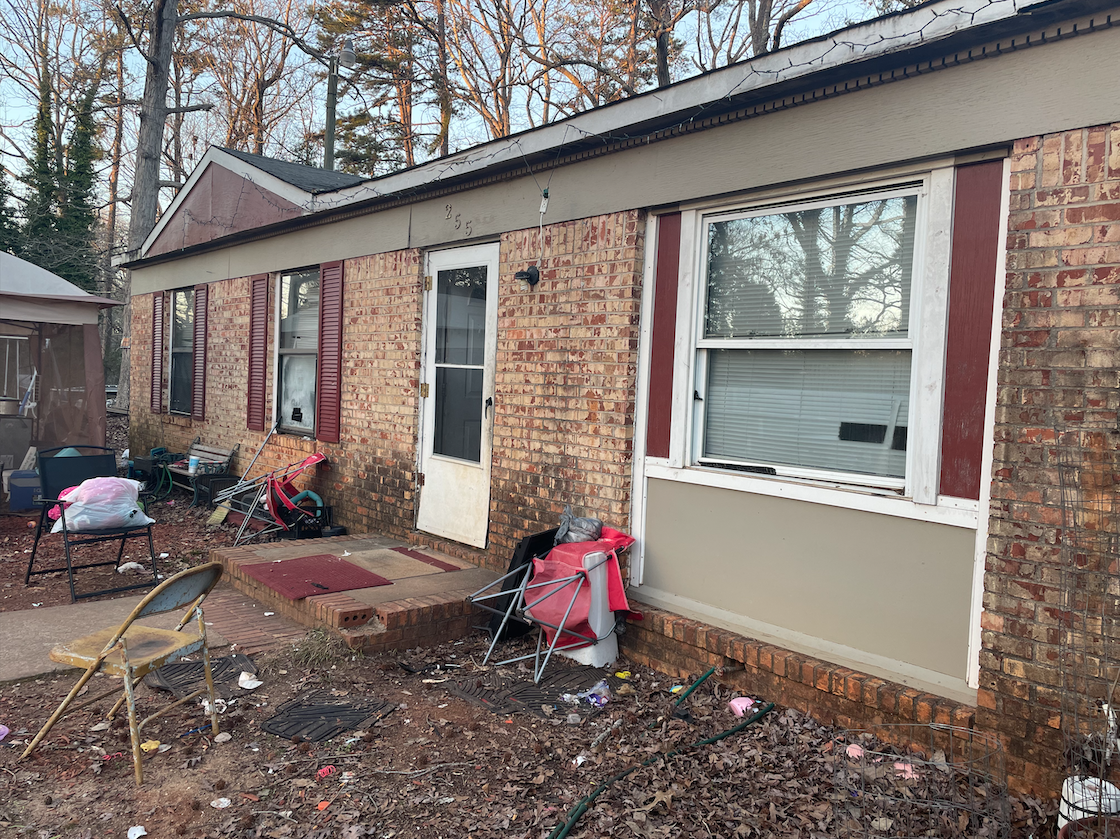
When Moesha Tutt opened her energy bill from Walton EMC in January, the nearly-$900 balance for a mere two months shocked her and brought her to tears.
The high bill was another stressor for her already-struggling family. After injuring her arm in a car wreck in October, Tutt, a single mother, was forced out of work. Her 6-year-old daughter constantly needed transportation to doctor’s visits because of various illnesses. On top of this, Tutt’s brother, who lives with her and her daughter in the three-bedroom home on the west side of Athens, lost his job in December 2022.
“We’ve been struggling for the last couple of months because we’ve been out of work,” Tutt said.
Why It’s Newsworthy: Athens-Clarke County residents, especially those that are low-income and live in communities of color, experience difficulty in paying energy bills due to a comparatively higher energy burden than the rest of the state and nation, impacting the way people spend and allocate their funds.Tutt and her family were not the only ones to receive high energy bills recently. According to the Consumer Price Index from the Bureau of Labor Statistics, energy prices have risen 8.7% nationwide since January 2022.
Many in the Athens-Clarke County area have uniquely struggled to pay their higher electricity bills, said Aron Hall, energy program and conservation coordinator in the Athens-Clarke County Sustainability Office. The county has a high energy burden, meaning a significant portion of residents’ income is devoted to paying energy bills.
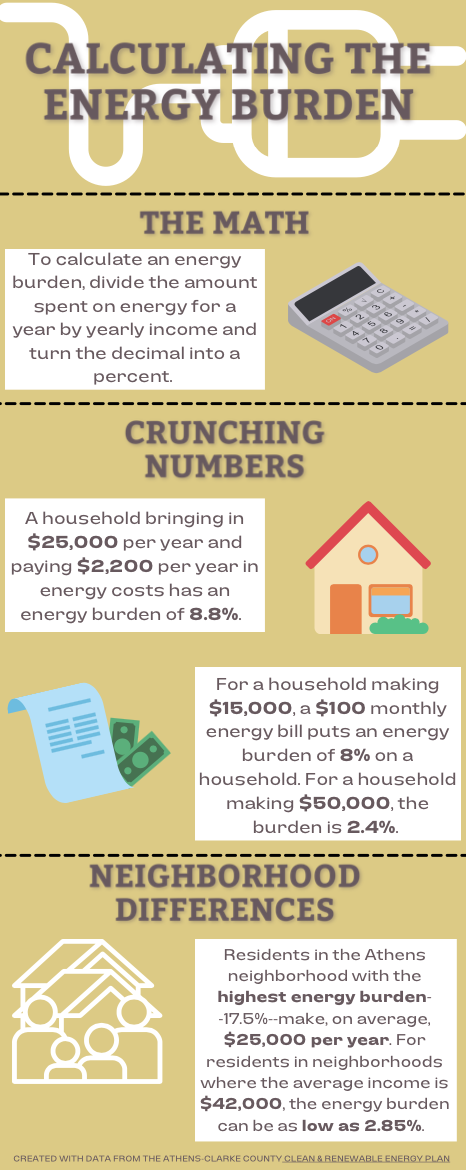
Strain of the Burden
Because they are devoting a high percentage of their income to paying their electricity bill, Tutt said her family has shuffled money around to handle other bills like rent and water, but they’ve been forced to make tough decisions on other essentials for the household.
“We’re low on food, we don’t [have] that much food left because we’ve been struggling,” Tutt said.“My child eats regardless, and then me and my brother, we’ll find like knickknack stuff to eat.”
The initial shock of the bill stemmed from the unexpectedly high price. The bill was nearly double what she’d come to expect after living in the home for seven years.
“I’m used to like a $200 bill for each month, but not no $400 for each month,” Tutt said. “I usually keep my bills down, but this one just shot up out of nowhere.”
In a desperate attempt to chip away at her outstanding balance, Tutt and her brother began donating plasma and delivering food through Instacart and DoorDash.
“We’ve been paying a little bit by little bit trying to break it down … we brought it down to $700.”
Tutt, in an effort to make sense of the bill, couldn’t think of a reason for the high price besides the age of her home.
Savannah Chandler, communications coordinator at Walton EMC, noted it couldn’t have been because of a rate increase–the company hasn’t imposed those in about two decades. She ventured a possible explanation: the unusually cold temperatures of December 2022.
“The largest percentage of energy use in the home is heating and cooling,” Chandler said. “All of our customers saw higher power bills because of the weather.”
Shouldering the Burden
Though every household devotes a certain amount of income to paying for energy, Athenians devote an average of 7% of their income to energy bills–comparatively higher, Hall said, than Georgia’s average and the nationwide average.
“Out of the Southeast, Athens has some of the highest energy burdens in the country,” Hall said.
Athens-Clarke County has a higher energy burden compared to the averages for Georgia and the United States as a whole. Aron Hall said this is due to a variety of factors, like poor housing stock and non-insulated homes. (Data Visualization/Anna Chapman)
The average Athens figures, however, don’t capture the dire situations of many families, Hall said. According to Athens-Clarke County’s energy equity analysis, some families in the lowest-income neighborhoods of Athens spend nearly 30% of their income on energy bills alone.
“I don’t know. The picture is … grim,” Hall said.
Various exacerbating factors contribute to these higher energy burdens in homes, disproportionately affecting low-income households and communities of color.
Hall noted that older, non-energy-efficient housing stock, which is more prevalent in lower-income communities, causes high energy bills. This is because more heat and air are needed to keep homes at comfortable temperatures than if they were well-insulated and less exposed to elements.
This is compounded by the drastic weather changes in Georgia and fluctuations in energy rates charged by power companies, Hall said.
“It’s a lot of things at play. It’s kind of like a perfect storm of burden on these families,” Hall said.
Hall and Cary Ritzler, Georgia organizer for the Southern Alliance for Clean Energy, said racially discriminatory housing practices known as redlining also contribute to the energy burden in the modern day.
Redlining, imposed in the 20th century, was a racially discriminatory practice that prevented homebuyers of color from getting loans for homes in certain neighborhoods, often composed of people of color. These practices often contained them to a few geographic areas of under-resourced neighborhoods.
“You see very similar trends of neighborhoods that were redlined … in [the] early to mid-1900s are now highly energy burdened,” said Cary Ritzler, Georgia organizer for the Southern Alliance for Clean Energy. “It’s because of the multitude of those factors.”
Same Burden, Different Companies
The majority of Athens, however, gets its energy from Georgia Power, according to Hall. Because of this, many Athenians will notice a rate increase on their energy bills this year.
In December 2022, the Georgia Public Service Commission, the elected regulatory agency for Georgia Power, approved a rate increase of about 12% over the next three years according to an agreement letter from the Georgia Public Service Commission.
“We’re trying to do our best to prevent [the energy burden],” said Tom Krause, a spokesperson with the Georgia Public Service Commission. “But there are also competing interests … We’re out here saying, ‘how best can we juggle this so we can keep prices [as] low as we can, keep reliability [as] high as we can, and still push towards cleaner energy?’”
Energy-focused organizations like the Sunrise Movement Athens and the Southern Alliance for Clean Energy, for which Ritzler organizes, spoke out against the proposed increases and criticized the Public Service Commission for exacerbating the energy burden for certain demographics by approving a rate increase.
“We know that people who are already energy burdened are going to bear the brunt of the [rate increases],” said Ritzler. “It does have a very real and immediate impact.”
John Kraft, a spokesperson for Georgia Power, insisted the company was mindful of the impact of rate increases on their customers when creating the request for the Public Service Commission.
Ultimately, he said, Georgia Power believed the outcome struck a balance between a variety of competing interests, including the company’s need to provide reliable power to their customers, expansion of energy to meet the state’s needs and their customers’ financial situations.
“We were able to bring forth a plan that considered all those perspectives, manages the impact to customers and supports our continued focus on providing that clean, safe, reliable and affordable energy,” Kraft said. “We think we come up with results that are working for our customers.”
David Weber, hub coordinator for the Sunrise Movement Athens, however, didn’t buy their explanation for the necessity of a rate increase and was not happy with the Public Service Commission’s decision.
“I was really, really disappointed when I saw the news of how it came out,” Weber, a master’s student at the University of Georgia, said.“It seemed pretty likely that they were going to increase the rates somewhat, but it seemed like just a pretty significant amount, and I know that’s just going to be really hard for a lot of people.”
Is Clean Energy the Way Out?
Taking notice of the harsh effects of the energy burden on Athens families, advocacy leaders and government workers said they believe that clean energy efforts will be the most effective way to ease the impact of the energy burden.
“If you look at energy burden, you can see like, it’s not an impossible problem to solve,” Ritzler said. “We know that clean energy can lower bills,” Ritzler said.
Both Ritzler and Hall agreed that putting efforts into energy efficiency and weatherization — the process of making one’s home more energy efficient and reducing energy use by protecting it from outside elements — is crucial to transitioning to clean energy and reducing energy costs.
“Putting efforts into energy efficiency and weatherization can reduce the amount of energy that houses have to use … and can make it more possible to meet energy needs with clean energy,” Ritzler said.
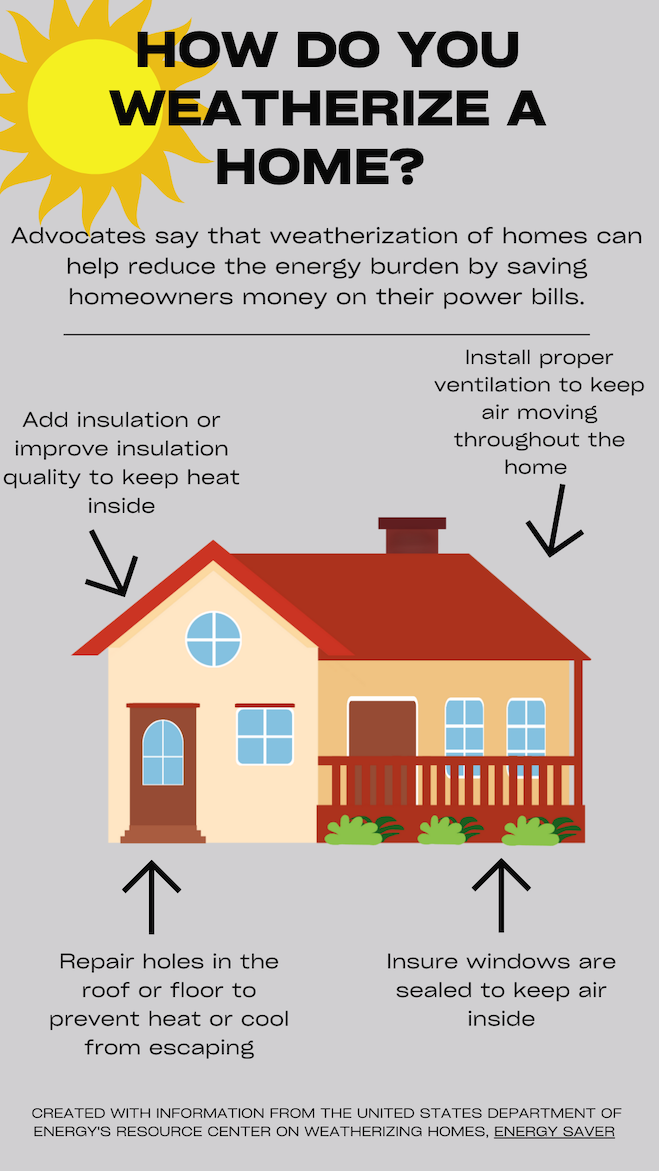
Hall, however, was hesitant to jump straight into clean energy installation like solar panels and instead prioritized education on weatherization and community building, noting that knowledge of clean energy options is the best first step and haphazardly investing in clean energy might be wasteful.
“The more people know about these things, I would hope it starts to click,” Hall said.
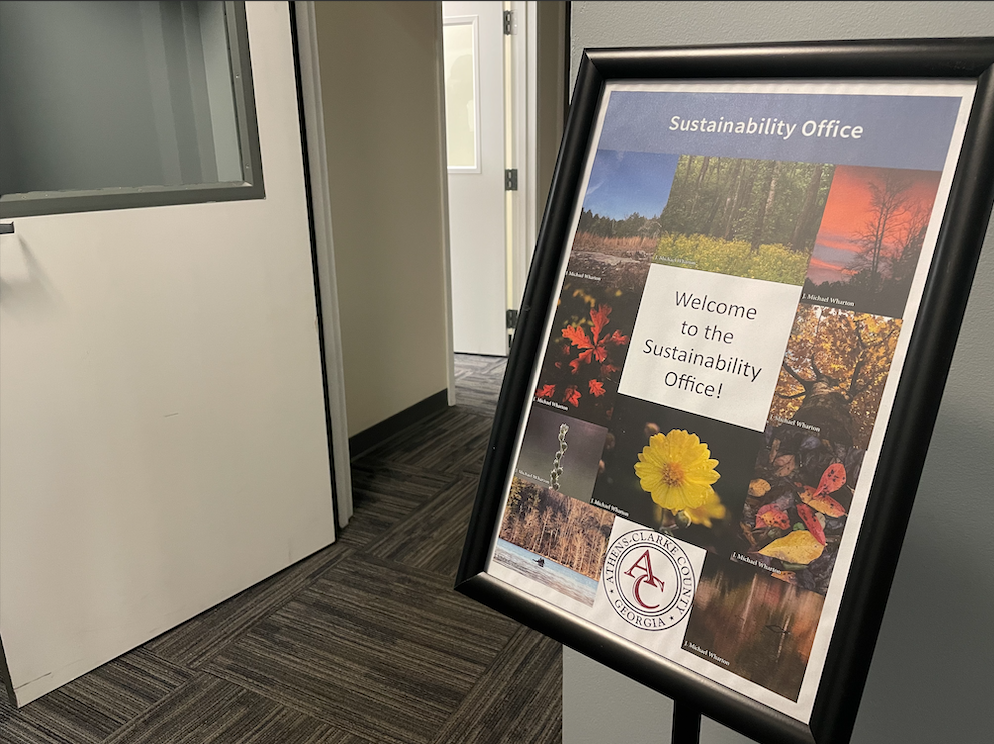
Weber noted the importance of an interdisciplinary approach to relieving the energy burden with clean energy solutions — a multi-faceted approach with community education, transitions to solar energy and weatherization initiatives.
“You can have a policy that creates programs that help people weatherize their homes, but if people don’t know about these programs, then they’re not affected,” Weber said. “All these approaches are really important.”
Despite the apparent abundance of opportunities, Hall was not as hopeful about a way out from the energy burden for Athenians.
“What do you do? How do you get utilities to stop charging so much? How do you get communities to invest in poor communities? How do you get housing stock up to where it needs to be?” Hall said. “I don’t know.”
Moesha Tutt, however, was cautiously optimistic about her ability to get out from under her energy bill. She said she’d persistently deliver food to pay off the bill.
“I need [the bill] gone,” Tutt said. “Keep doing Instacart and DoorDash. I’ll make a way.”
Anna Chapman is a senior majoring in journalism in the Grady College of Journalism and Mass Communication and obtaining a certificate in public affairs communications at the University of Georgia.


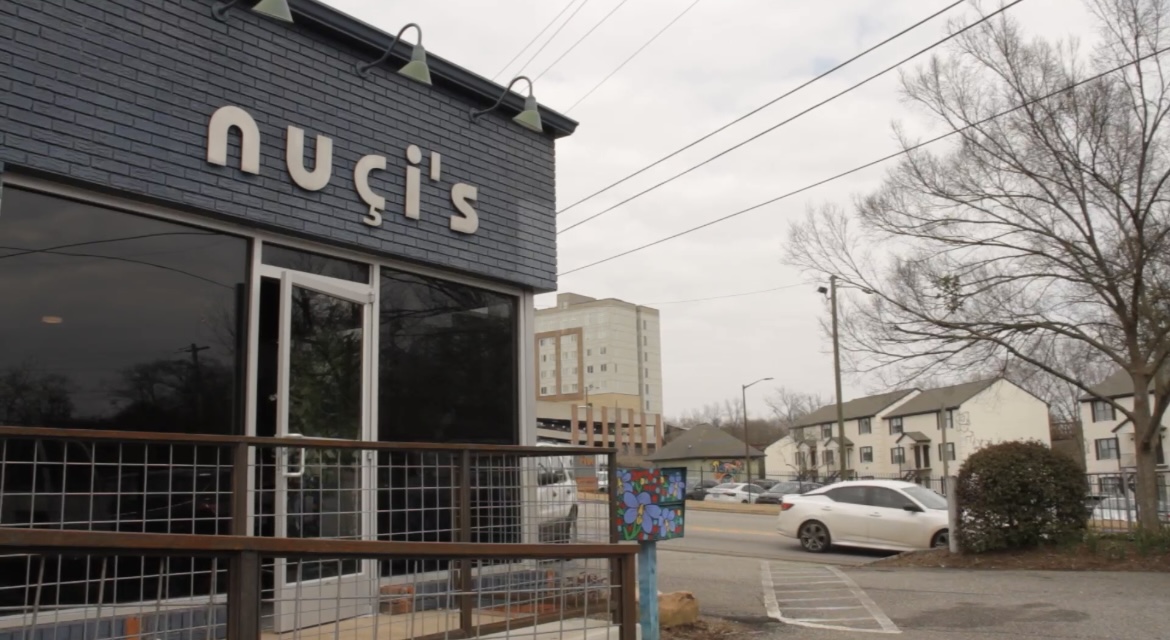





Show Comments (0)